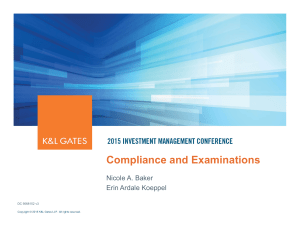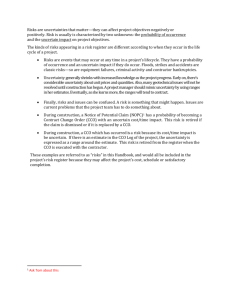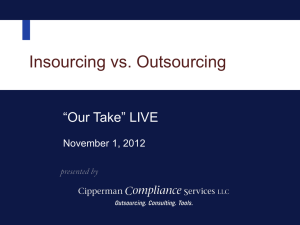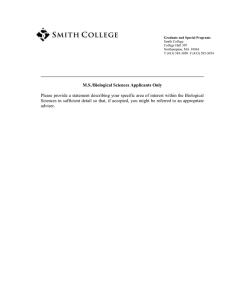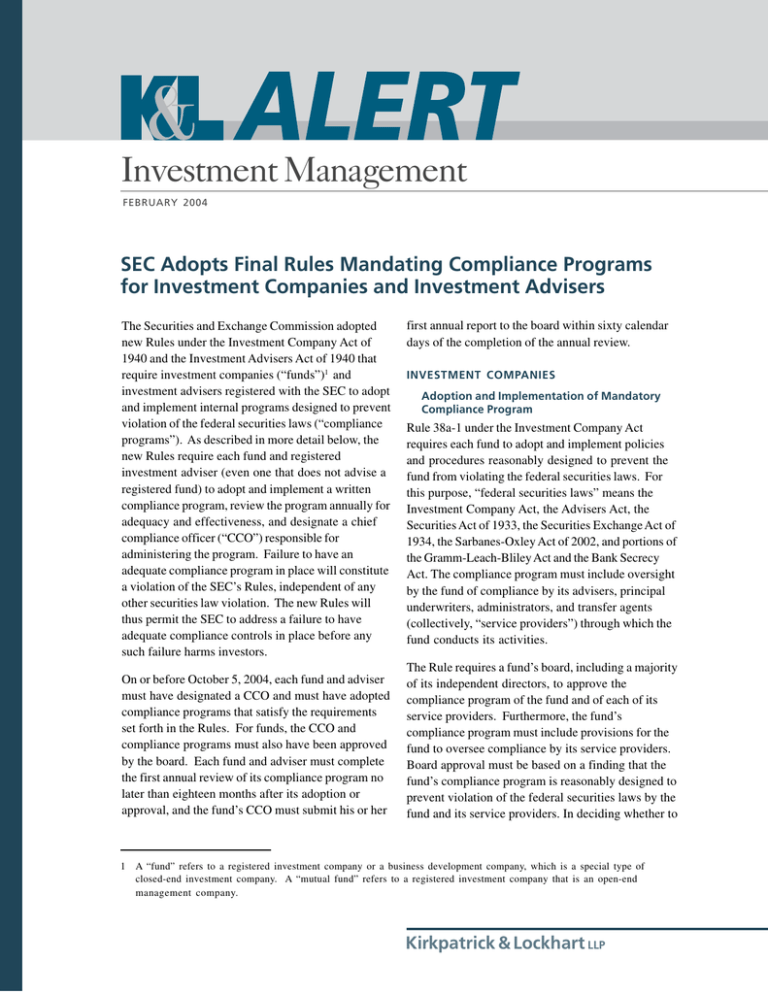
Investment Management
FEBRUARY 2004
SEC Adopts Final Rules Mandating Compliance Programs
for Investment Companies and Investment Advisers
The Securities and Exchange Commission adopted
new Rules under the Investment Company Act of
1940 and the Investment Advisers Act of 1940 that
require investment companies (“funds”)1 and
investment advisers registered with the SEC to adopt
and implement internal programs designed to prevent
violation of the federal securities laws (“compliance
programs”). As described in more detail below, the
new Rules require each fund and registered
investment adviser (even one that does not advise a
registered fund) to adopt and implement a written
compliance program, review the program annually for
adequacy and effectiveness, and designate a chief
compliance officer (“CCO”) responsible for
administering the program. Failure to have an
adequate compliance program in place will constitute
a violation of the SEC’s Rules, independent of any
other securities law violation. The new Rules will
thus permit the SEC to address a failure to have
adequate compliance controls in place before any
such failure harms investors.
On or before October 5, 2004, each fund and adviser
must have designated a CCO and must have adopted
compliance programs that satisfy the requirements
set forth in the Rules. For funds, the CCO and
compliance programs must also have been approved
by the board. Each fund and adviser must complete
the first annual review of its compliance program no
later than eighteen months after its adoption or
approval, and the fund’s CCO must submit his or her
1
first annual report to the board within sixty calendar
days of the completion of the annual review.
INVESTMENT COMPANIES
Adoption and Implementation of Mandatory
Compliance Program
Rule 38a-1 under the Investment Company Act
requires each fund to adopt and implement policies
and procedures reasonably designed to prevent the
fund from violating the federal securities laws. For
this purpose, “federal securities laws” means the
Investment Company Act, the Advisers Act, the
Securities Act of 1933, the Securities Exchange Act of
1934, the Sarbanes-Oxley Act of 2002, and portions of
the Gramm-Leach-Bliley Act and the Bank Secrecy
Act. The compliance program must include oversight
by the fund of compliance by its advisers, principal
underwriters, administrators, and transfer agents
(collectively, “service providers”) through which the
fund conducts its activities.
The Rule requires a fund’s board, including a majority
of its independent directors, to approve the
compliance program of the fund and of each of its
service providers. Furthermore, the fund’s
compliance program must include provisions for the
fund to oversee compliance by its service providers.
Board approval must be based on a finding that the
fund’s compliance program is reasonably designed to
prevent violation of the federal securities laws by the
fund and its service providers. In deciding whether to
A “fund” refers to a registered investment company or a business development company, which is a special type of
closed-end investment company. A “mutual fund” refers to a registered investment company that is an open-end
management company.
Kirkpatrick & Lockhart LLP
approve the proposed compliance programs, a fund’s
board can rely on summaries of the compliance
programs that are prepared by the fund’s CCO or by
its service providers. During this approval process,
the SEC suggests that fund boards seek input from
their legal counsel and compliance experts, and
consider industry best practices.
In the release adopting the Rule, the SEC states that
fund compliance programs should address the issues
outlined for advisers below, as well as the following
“critical” areas:
Pricing of Portfolio Securities and Fund
Shares – policies and procedures should be
adopted to require the fund to monitor for
circumstances that may necessitate the use of
fair value prices; establish criteria for
determining when market quotations are no
longer reliable; provide a methodology by
which the fund determines current fair value;
and regularly review the appropriateness and
accuracy of the methods used in valuing
securities, and adjust as necessary.
Processing of Fund Shares – procedures
should be adopted that segregate investor
orders received before a fund’s pricing time
from those received after the fund’s pricing
time. Because orders are ultimately transferred
to transfer agents, the SEC expanded the
service providers covered by the Rule to
include transfer agents. Reliance on existing
contractual provisions with transfer agents and
other intermediaries that obligate those parties
to segregate orders to prevent late trading
would be insufficient to meet the requirements
of the new Rule. Funds are expected to
approve and periodically review the policies
and procedures of transfer agents as well as
take affirmative steps to protect against late
trading by obtaining assurances that those
policies and procedures are effectively
administered.2
2
Identification of Affiliated Persons – policies
and procedures should be adopted to identify
first and second-tier affiliates of a fund, the
fund’s principal underwriters, and affiliated
persons of the fund’s principal underwriters to
prevent unlawful transactions with them.
Protection of Nonpublic Information –
policies and procedures should be adopted to
address other potential misuses of nonpublic
information, including disclosure to third
parties of material information about the fund’s
portfolio, its trading strategies, and pending
transactions and the purchase or sale of fund
shares by advisory personnel based on
material, nonpublic information about the
fund’s portfolio.
Compliance with Fund Governance
Requirements – policies and procedures
should be designed to guard against an
improperly constituted board, the failure of the
board to properly consider matters entrusted to
it, and the failure of the board to request and
consider information required by the
Investment Company Act from the adviser and
other service providers.
Market Timing – procedures should be
reasonably designed to ensure compliance with
a fund’s disclosed policies regarding market
timing. These procedures should provide for
monitoring of shareholder trades or flows of
money in and out of the fund in order to detect
market-timing activity, and for consistent
enforcement of the fund’s policies regarding
market timing. If the fund permits waivers of
those policies, the procedures should be
reasonably designed to prevent waivers that
would harm the fund or its shareholders or
subordinate the interests of the fund or its
shareholders to those of the adviser or any
other affiliated or associated person. Permitted
waivers should be reported to the board
The adopting release states that, when a fund has employed the services of a service provider, such as a transfer agent,
that is not affiliated with the fund, the fund’s compliance program will satisfy the requirements of the Rule if the fund
uses a third-party report to assess the adequacy of the service provider’s compliance controls. An example of such a
report is Codification of Accounting Standards and Procedures, Statement on Auditing Standards No. 70, Reports on
Processing Transactions by Service Organizations (American Institute of Certified Public Accountants.)
Kirkpatrick & Lockhart LLP
2
quarterly to allow the board to determine if they
were proper.
Annual Review
Rule 38a-1 requires each fund to review its
compliance program as well as those of its service
providers annually. The Rule does not require a
fund board to conduct the review. Rather, a board
could receive a report summarizing the results of the
annual review from the fund’s CCO, who would have
reviewed the fund’s compliance program and those of
each service provider. In addition to the required
annual review, the SEC anticipates that funds will
review their compliance programs periodically, as
necessary in light of ongoing industry regulatory
developments.
Chief Compliance Officer
Rule 38a-1 requires each fund to appoint a CCO who
would be responsible for administering the fund’s
compliance program approved by the board under
the Rule. The adopting release provides little
guidance to assist in a fund board’s designation or
approval of a CCO, and it is possible that such
guidance as the SEC has provided might change as
fund complexes attempt to comply with the new
requirements. However, the adopting release states
that the CCO should be:
competent and knowledgeable regarding the
federal securities laws and should be
empowered with full responsibility and
authority to develop and enforce appropriate
policies and procedures for the fund; and
familiar with fund service providers’
operations, especially with aspects of service
provider operations that expose the fund to
compliance risks.
The SEC also emphasized that the fund’s CCO should
have a position of seniority and authority sufficient
to compel others to adhere to the fund’s compliance
program. This all suggests that a fund’s board
should consider not only the qualities of the
candidate being designated as CCO, but also the
3
structure of the position within which the CCO will
fulfill his or her duties to the fund.
The adopting release states that a fund’s CCO
serves in his or her position at the pleasure of the
fund’s board, is required to report directly to the
board, and must:
be responsible for administering the fund’s
compliance program;
provide the fund’s board a written report
annually on the adequacy and effectiveness of
the fund’s compliance program including: (i)
the operation of the compliance program and
those of the service providers; (ii) any material
changes to the compliance program; (iii) any
recommendation for material changes to the
compliance program as a result of the annual
review; and (iv) any material compliance
matters;3
always bring “serious” compliance issues to
the attention of the fund’s board (reporting of
serious compliance issues cannot be delayed
until an annual report is due);
meet at least once annually in executive
session with the independent directors without
management or the interested directors present
(counsel to the independent directors may
attend these executive sessions); and
oversee the fund’s service providers to assure
that each has implemented effective compliance
programs administered by competent
personnel.
The adopting release points out that the appointment
of a CCO is a key element in the investor protections
being adopted and that current compliance practices
at some companies may isolate fund boards from
compliance personnel, impeding their ability to
exercise oversight responsibilities effectively. Rule
38a-1 provides fund boards with direct access to a
single person with overall compliance responsibility
for the fund who answers directly to the board. The
The CCO will be directly responsible for apprising the board of any “material compliance matter,” which is defined in the
rule as “any compliance matter about which the fund’s board of directors would reasonably need to know to oversee fund
compliance,” and that involves: (1) a violation of federal securities laws by the fund or its service providers; (2) a
violation of the policies adopted by the fund or its service providers; or (3) a weakness in the design of the policies
adopted by the fund or its service providers.
Kirkpatrick & Lockhart LLP
3
adopting release suggest that this direct line of
communication will also strengthen the hand of
compliance personnel because information will not
flow through management before reaching the board.
While there is no interpretation of the new Rules thus
far, it is clear that a fund’s CCO can be the same
person as the CCO of its adviser. In fact, the SEC has
implied that this would be preferable. The adopting
release anticipates that a fund’s CCO will be
employed by the investment adviser or administrator,
and suggests that having the CCO employed only by
the fund could actually weaken his or her
effectiveness since the CCO would then be divorced
from day-to-day fund operations. Recognizing that a
CCO who is an employee of the adviser might be
conflicted in his or her duties, the Rule attempts to
address these concerns by requiring a fund’s CCO to
report directly to the board. A CCO that fails to fully
inform a board of a material compliance failure or who
fails to aggressively pursue non-compliance would
risk his or her position.
The Rule contains provisions designed to promote
the independence of a fund’s CCO in any event. The
Rule provides that:
the fund’s board, including a majority of the
independent directors, must approve the
designation of the CCO;
the fund’s board, including a majority of the
independent directors, must approve the
compensation of the CCO, and any changes in
his or her compensation, including any
bonuses;
the fund’s board, including a majority of the
independent directors, can remove the CCO
from his or her responsibilities to the fund;
the fund’s board, including a majority of the
independent directors, can prevent the adviser
or the fund’s officers from removing the CCO
from his or her responsibilities to the fund; and
the officers, directors, or employees of the
fund, its adviser, principal underwriter or any
persons under their direction are prohibited
from directly or indirectly taking any action to
coerce, manipulate, mislead or fraudulently
influence the CCO.
The CCO will oversee compliance with the Rule by
the fund’s service providers, each of which will have
its own compliance official. A CCO is expected to
take steps to assure himself or herself that each
service provider has implemented effective
compliance programs that are administered by
competent personnel. The CCO should be familiar
with each service provider’s operations and
understand those aspects of their operations that
expose the fund to compliance risks. The CCO is
expected to have direct access to compliance
personnel at the service providers and should be
provided with periodic reports and special reports in
the event of compliance problems. In addition, the
fund’s contracts with its service providers might also
require service providers to certify periodically that
they are in compliance with applicable federal
securities laws, or could provide for third-party
audits arranged by the fund to evaluate the
effectiveness of the service provider’s compliance
controls. Essentially, under the Rule, there should be
no material constraints on the CCO in fulfilling his or
her duties, including having the ability to access
outside experts as appropriate.
A question has arisen as to whether an adviser can
expect a fund to pay a part of the compensation for a
person who serves as CCO for both the adviser and
the fund. Advisers should approach this issue
cautiously. Advisory agreements typically require
the adviser to provide an investment program that
complies with the federal securities laws and the
fund’s investment policies and limitations, which
could be read to imply that compliance oversight is a
function for which the adviser is already being paid
under the contract. Thus, in order to justify
additional compensation from the fund, it would seem
appropriate to identify new tasks that the CCO is
required to perform specifically in his or her role as
CCO of the fund, and determine the compensation
appropriate to those tasks.
INVESTMENT ADVISERS
Adoption and Implementation of Mandatory
Compliance Program
New Rule 206(4)-7 under the Advisers Act requires
each registered investment adviser to adopt and
implement compliance procedures that conform to the
new Rule. The Rule may eventually apply to a much
larger group of advisers if the SEC follows through
Kirkpatrick & Lockhart LLP
4
on the staff’s recommendation and requires that
advisers to hedge funds count the investors in such
funds for purposes of the exemption in Section
203(b)(3) of the Advisers Act.4
Under Rule 206(4)-7, it is unlawful for a registered
adviser to provide investment advice unless it has
adopted and implemented a written compliance
program reasonably designed to prevent violation of
the Advisers Act by the adviser or any of its
supervised persons.5 The Rule requires advisers to
formalize policies and procedures intended to
address their fiduciary and regulatory obligations
under the Advisers Act.
The policies and procedures for a registered adviser
need only encompass compliance considerations
relevant to the operations of that particular adviser,
as the Rule requires that such policies be
“reasonably” designed to prevent violations of the
Advisers Act. The Rule does not specify topics and
practices that should be covered by the compliance
program. However, the adopting release states that
the compliance program should be designed to
prevent violations of securities laws and include
provisions for detection and remedial measures
should such violations occur.
The adopting release states that at a minimum, the
following issues should be addressed to the extent
relevant to the adviser: (1) portfolio management
processes, including allocation of investment
opportunities, disclosures by the adviser, and
applicable regulatory restrictions; (2) trading
activities, including procedures to obtain best
execution, soft dollar arrangements, and allocation of
aggregated trades; (3) proprietary trading of the
adviser and personal trading of supervised persons;
(4) accuracy of disclosures made to investors, clients
and regulators, including account statements and
advertisements; (5) safeguarding of client assets from
conversion or inappropriate use; (6) accurate recordkeeping and maintenance; (7) marketing advisory
services; (8) processes to value client holdings and
assess fees based on those valuations; (9)
safeguards for the privacy protection of client
records and information; and (10) business
continuity plans.
Annual Review
Rule 206(4)-7 requires each adviser to review its
compliance program annually for adequacy and
effectiveness of implementation. The review should
consider any compliance matters that arose during
the previous year and possible revisions to the
program to address changes in the business
activities of the adviser or its affiliates or in the
Advisers Act or applicable regulations. The
adopting release points out that, although the Rule
only requires an annual review, interim reviews may
be necessary in response to significant compliance
events, changes in business arrangements, and
regulatory developments.
Chief Compliance Officer
Under Rule 206(4)-7, each adviser must designate a
CCO to administer its compliance program. An
adviser’s CCO should be competent and
knowledgeable regarding the Advisers Act and
empowered with full responsibility and authority to
develop and enforce an appropriate compliance
program for the adviser. The adopting release
emphasizes that the CCO should have a position of
seniority and authority sufficient to compel others to
adhere to the compliance program. In relation to this
requirement, the SEC is amending Form ADV to
require that each registered adviser and applicant for
registration as an adviser identify a single
compliance officer.
The adopting release points out that the title of CCO
does not, in and of itself, carry supervisory
responsibilities. Thus, a CCO would not necessarily
be subject to sanction by the SEC for failure to
supervise other advisory personnel. A compliance
officer who does have supervisory responsibilities
can continue to rely on the defense provided for in
4
On September 29, 2003, the SEC released a staff report entitled “The Implications of the Growth of Hedge Funds,” which
presented findings from an SEC fact-finding investigation into the operations and practices of the hedge fund industry.
5
A “supervised person” is defined as “any partner, officer, director (or other person occupying a similar status or
performing similar functions), or employee of an investment adviser, or other person who provides investment advice on
behalf of the investment adviser and is subject to the supervision and control of the investment adviser.”
Kirkpatrick & Lockhart LLP
5
Section 203(e)(6) of the Advisers Act.6 Furthermore,
the release states that the Rule does not require an
adviser to hire an additional executive to serve as
the CCO, but rather to designate an individual as the
adviser’s CCO.
programs and the annual written reports by the
fund’s CCO. Funds and advisers are also required to
keep any records documenting their annual review.
These records may be maintained electronically, but
must be provided in electronic format to the SEC
upon request.
RECORD-KEEPING
The new Rule and Rule amendments require firms to
maintain copies of all compliance programs in effect
at any time in the last five years, including materials
provided to boards in connection with their approval
of the fund’s and their service providers’ compliance
6
BENJAMIN J. HASKIN
202.778.9369
bhaskin@kl.com
NDENISARYA MEEKINS
202.778.9021
nmeekins@kl.com
Section 203(e)(6) provides that a person shall not be deemed to have failed to reasonably supervise another person if:
(i) the adviser had adopted procedures reasonably designed to prevent and detect violations of the federal securities laws;
(ii) the adviser had a system in place for applying the procedures; and (iii) the supervising person had reasonably
discharged his supervisory responsibilities in accordance with the procedures and had no reason to believe the supervised
person was not complying with the procedures.
Kirkpatrick & Lockhart LLP
6
Kirkpatrick & Lockhart LLP maintains one of the leading investment management practices in the United States,
with more than 60 lawyers devoting all or a substantial portion of their practice to this area and its related
specialties. The American Lawyer Corporate Scorecard, published in April 2003, lists K&L as a primary legal
counsel to the investment companies, board members or advisory firms for 15 of the 25 largest mutual fund
complexes. No law firm was mentioned more frequently in the Scorecard.
We represent mutual funds, closed-end funds, insurance companies, broker-dealers, investment advisers, retirement
plans, banks and trust companies, hedge funds, offshore funds and other financial institutions. We also regularly
represent mutual fund distributors, independent directors of investment companies and service providers to the
investment management industry. In addition, we frequently serve as outside counsel to industry associations on a
variety of projects, including legislative and policy matters.
We work with clients in connection with the full range of investment company industry products and activities,
including all types of open-end and closed-end investment companies, funds of hedge funds, variable insurance
products, private and offshore investment funds and unit investment trusts. Our practice involves all aspects of
the investment company business.
We invite you to contact one of the members of the practice, listed below, for additional assistance. You may also
visit our website at www.kl.com for more information, or send general inquiries via email to
investmentmanagement@kl.com.
BOSTON
Michael S. Caccese
Philip J. Fina
Mark P. Goshko
Thomas Hickey III
Nicholas S. Hodge
617.261.3133
617.261.3156
617.261.3163
617.261.3208
617.261.3210
mcaccese@kl.com
pfina@kl.com
mgoshko@kl.com
thickey@kl.com
nhodge@kl.com
LOS ANGELES
William P. Wade
310.552.5071
wwade@kl.com
NEW YORK
Philip L. Kirstein
Beth R. Kramer
Richard D. Marshall
Robert M. McLaughlin
Keith R. Miller
Loren Schechter
212.536.483
212.536.4024
212.536.3941
212.536.3924
212.536.4045
212.536.4008
pkirstein@kl.com
bkramer@kl.com
rmarshall@kl.com
rmclaughlin@kl.com
kmiller@kl.com
lschechter@kl.com
SAN FRANCISCO
Eilleen M. Clavere
Jonathan D. Joseph
David Mishel
Mark D. Perlow
Richard M. Phillips
415.249.1047
415.249.1012
415.249.1015
415.249.1070
415.249.1010
eclavere@kl.com
jjoseph@kl.com
dmishel@kl.com
mperlow@kl.com
rphillips@kl.com
WASHINGTON
Clifford J. Alexander
Diane E. Ambler
Catherine S. Bardsley
Arthur J. Brown
Arthur C. Delibert
Robert C. Hacker
Benjamin J. Haskin
Kathy Kresch Ingber
Rebecca H. Laird
Thomas M. Leahey
Cary J. Meer
R. Charles Miller
Dean E. Miller
R. Darrell Mounts
C. Dirk Peterson
David Pickle
Alan C. Porter
Theodore L. Press
Robert H. Rosenblum
William A. Schmidt
Lynn A. Schweinfurth
Donald W. Smith
Martin D. Teckler
Robert A. Wittie
Robert J. Zutz
202.778.9068
202.778.9886
202.778.9289
202.778.9046
202.778.9042
202.778.9016
202.778.9369
202.778.9015
202.778.9038
202.778.9082
202.778.9107
202.778.9372
202.778.9371
202.778.9298
202.778.9324
202.778.9887
202.778.9186
202.778.9025
202.778.9464
202.778.9373
202.778.9876
202.778.9079
202.778.9890
202.778.9066
202.778.9059
calexander@kl.com
dambler@kl.com
cbardsley@kl.com
abrown@kl.com
adelibert@kl.com
rhacker@kl.com
bhaskin@kl.com
kingber@kl.com
rlaird@kl.com
tleahey@kl.com
cmeer@kl.com
cmiller@kl.com
dmiller@kl.com
dmounts@kl.com
dpeterson@kl.com
dpickle@kl.com
aporter@kl.com
tpress@kl.com
rrosenblum@kl.com
william.schmidt@kl.com
lschweinfurth@kl.com
dsmith@kl.com
mteckler@kl.com
rwittie@kl.com
rzutz@kl.com
Kirkpatrick & Lockhart LLP
Challenge us.
www.kl.com
BOSTON
DALLAS
HARRISBURG
LOS ANGELES
MIAMI
NEWARK
NEW YORK
PITTSBURGH
SAN FRANCISCO
WASHINGTON
............................................................................................................................................................
This publication/newsletter is for informational purposes and does not contain or convey legal advice. The information herein
should not be used or relied upon in regard to any particular facts or circumstances without first consulting a lawyer.
© 2004 KIRKPATRICK & LOCKHART LLP. ALL RIGHTS RESERVED.

